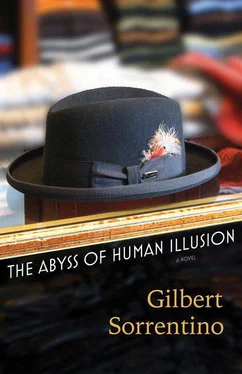THE MORNING
The man bought them both chili with beans, flour tortillas, and a couple of cold Carta Blancas the next morning in a little Mexican hole in the wall, said he had to get to work, and they shook hands. Donnie felt ill at ease, in the knowledge that the man had surely known of his aberrant desire of the night before, but nothing, of course, was said by either of them, and the little fat man’s visit or appearance was as if it had never occurred; it existed as a vague invention.
Donnie walked, losing his way three or four times, to the bus depot and as he got to the entrance a Sergeant First Class with an I Corps patch came out and Donnie asked him if maybe he could spare a buck toward a ticket back to Fort Sam. The sergeant laughed at him: “Walk, you sorry fuck,” he said.
Donnie spent the next six hours panhandling while avoiding M.P.’s until he finally had enough money to buy a ticket back to the fort. He got to his barracks about 4:00 p.m.; a couple of semi-drunks were playing rummy on top of a foot locker, drinking Lone Star and eating hot cherry peppers; otherwise the almost silent barracks had that sad, chaotic Sunday look. One of them looked up, and smiled. “Hey, daddy cool — you get you some hot Meskin ass?” Donnie smirked and pumped his fist. “Fuckin’ A.”
Five years before the crash of October 1929, Guy Bonney — the name an Americanization of Gaetano Bonifacio — married Charlotte Briczewicz, a girl of Polish extraction. He’d met her at a “good clean dance” in Saint Rocco’s basement, and they began keeping company, as they used to say, soon after. Her family was bitterly unhappy, fearing, perhaps, that the pure Polish blood of their ancient Tarnowski line would be forever tainted. Guy was a Catholic, but … On the other hand, Guy’s family was accepting of Charlotte, the marriage, and even what they considered to be her strange moralistic family — it’s fine to be Catholic, but the Briczewiczes seemed, well, a little crazy? As Mr. Bonifacio said after a visit “All the saintsa pitcha all over the house-a! Madonn’!” They were aware, too, of the slightly disguised bigotry of Charlotte’s family toward “Eyetalians,” but, perhaps because of their roiled Mediterranean ancestry, figured that since we are all mongrels that it doesn’t much matter who marries anybody.
Guy began to do well in the small home-contracting and remodeling business he’d begun with an older brother, Angelo, and soon a son was born to the couple, who were living in a small frame house in Gerritsen Beach. They were happy, more or less, but Charlotte, swayed by her parents and their unrelenting campaign, had begun to feel superior to Guy, and to find many occasions on which to suggest to him that he was, ah, lacking in some of those things that made America a great country for real Americans. His father, my God, she often noted as if in passing, could hardly speak English, and even Guy, even Guy had a faint accent, not much, but a little. It was sometimes a little embarrassing when they stepped out for the evening with another “nice” couple (“nice” may be read as “refined” Americans). Guy wondered why his supposed accent had never been mentioned before they were married. Well, she was a pretty good wife, despite her growing oddities.
Guy’s business had, of course, suffered because of the deepening Depression, but with ingenuity, a little luck, and some contacts he’d made, he got a city contract here, some NRA work there, and so on, and they seemed to be doing just fine. This, it may come as no surprise, annoyed the Briczewicz family, and, for that matter, Charlotte herself, even though she had a new bedroom suite, an electric refrigerator — a Frigidaire! — and a gray Persian lamb coat. The story, which emerged, sluglike, from the muck of her family’s gossip, was that Guy — Guytanno! — was some kind of a gangster or something, or that he was mixed up with gangsters; something was going on. Wasn’t his office on Wolcott Street in Red Hook, where all the Black Hand guineas lived and figured out ways to steal from decent Americans? Them and the kikes? The atmosphere between Guy and his in-laws was not exactly poisonous, but he was made to understand that he’d better “be good” to Charlotte and her little Stanley, even though the poor baby, so they thought, was sadly corrupted; thank God that he was at least blond. It was the Novena that Mrs. Briczewicz had made to the Infant Jesus of Prague that gave them that small gift. Well, God had his reasons, but they could be hard to understand.
Guy tried to pay as little heed to this blanket malice as possible, and, in what was a misplaced attempt to persuade his in-laws to warm to him, to convince them that he was a good solid American husband and father, he regularly invited them to dinner with him and Charlotte and the baby. They dined, always, in a restaurant on Forty-forth Street just west of Eighth Avenue, the Milano, to which, it should be said, he drove them in a new Packard that his excellent credit had made it possible for him to buy: they looked wisely at each other as they settled into its rear seat. His “mom” and “dad” always accepted these invitations, for Charlotte had made it clear to them that they needn’t worry that the Eyetalian family would accompany them: she had to suffer their loud hospitality once a month at their house in Bath Beach, and she’d let Guy know, indeed, that that was enough! His in-laws despised the fact of the Milano almost as much as they despised the fact of the Packard, but most of all, they were angry that Guy had the money to pay for these dinners! Where did he get this money? Nonetheless, they packed the food in, from the antipasto through the cannoli and espresso with anisette, complaining that this “spicy Eyetalian food” would, as always, give them terrible heartburn. “It’s just like all Eyetalian food,” Mrs. Briczewicz said, with wondrous regularity. “You’d think that after being in this country all these years they’d learn how to cook the right way.” She would shake her head at such barbarian intransigence.
Charlotte’s family — and Charlotte as well — refused to pronounce the name of the restaurant correctly, even though they had heard Guy, as well as various waiters and the owner, say the word many times. They called it the MY-LANNO, seeming to savor the disappointed look on Guy’s face. He’d corrected them the first few weeks, and then realized what was being done: this was a subversive marginalization of him. MY-LANNO was an American word, or should be. Period. And so Guy, without calling attention to it, began to say “MY-LANNO” as well, and was aware of the smug contempt of Charlotte and her parents in their easy victory.
Now he had lost, one might say, virtually everything but his business, and had become just another dim, wayward American — or so he perhaps regretfully thought. But Charlotte was still his, still blond and blue-eyed, still nice to look at. It wasn’t really important to be what he had once been. Was it? “Are you and Sophie free for dinner Sunday at the MY-LANNO?” he’d ask his father-in-law. Who would pause to think about his answer, oh yes, pause to think about it.
Billy and his wife, Audrey, were vegetarians, and, like many people who embrace what they consider to be salutary and superior modes of behavior, they, in their perfection, slowly yet relentlessly marginalized all those friends who were not of their dietary persuasion. In this, they were, perhaps, much like cultists, whose happily demented myths make them smugly exclusionary. As the years passed, and up to their elbows in brown rice and tofu, they made many new friends of their ilk, of course.
Читать дальше












